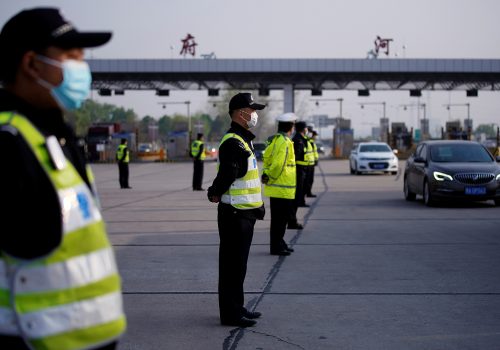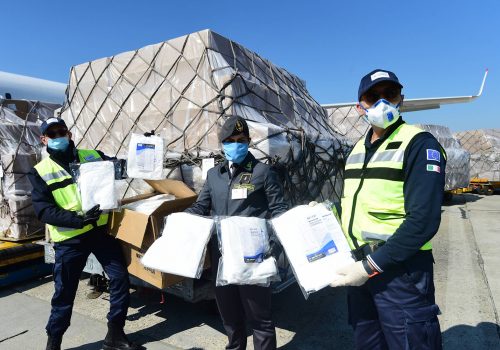Scenario pluralism, fragmentation, and resilience in the COVID-19 era
Nobody actually knows what the world will look like after the COVID-19 crisis. But that does not diminish the value of attempting some kind of strategic foresight.
Many different scenarios have been posited for what the future holds: the rise of China, the decline of a marginalized United States, snap-back recovery in the United States, loss of Chinese influence amid repatriated supply chains, weakening of the European Union, greater solidarity within the Eurozone. Too many of these scenarios share the flaw of trying to gauge everything through the lens of one paramount explanation from which all findings flow.
Sir Isaiah Berlin, in his essay “The Apotheosis of the Romantic Will,” wrote: “If I may be permitted an almost unpardonable degree of simplification and generalization, I should like to suggest that the central core of the intellectual tradition in the West has, since Plato…rested upon three unquestioned dogmas: (a) that to all genuine questions there is one true answer and one only…; (b) that the true answers to such questions are in principle knowable; (c) that these true answers cannot clash with one another.”
Berlin’s purpose in articulating these dogmas was to refute them.
Berlin was a proponent of “value pluralism.” As Joshua Cherniss and Henry Hardy write in their contribution on Berlin to the Stanford Encyclopedia of Philosophy, “according to Berlin’s pluralism, genuine values are many, and may—and often do—come into conflict with one another. When two or more values clash, it does not mean that one or another has been misunderstood; nor can it be said, a priori, that any one value is always more important than another.”
In attempting to arrive at a strategic forecast of the world post-COVID-19, we would do well to apply Berlin’s intellectual legacy of value pluralism to the construction of our scenarios. We might consider this, and we might call this, “scenario pluralism,” which would consist in the recognition that no single over-arching scenario will prevail, that seemingly contradictory actions and reactions will coexist alongside each other and that recognizing those contradictions—far from undermining the credibility of our scenarios—actually makes them more realistic and thereby more robust.
Another way to illustrate this scenario pluralism could be to apply the principle of “transformation maps” used by the World Economic Forum, which are designed to “help users to explore and make sense of the complex and interlinked forces that are transforming economies, industries and global issues.” In this case, the transformation maps would apply not to the interrelated issues of today but to the hypotheses about tomorrow.
Or, to keep concepts simple, we might merely designate this strategic forecasting principle as “fragmentation.”
We already see fragmentation happening in the many different responses to the crisis. Countries have reacted with highly disparate degrees of health system preparedness, governmental actions, and societal behaviors. In Asia, both South Korea and Taiwan showed themselves more ready and more organized, arguably even more than Singapore. In Europe, Sweden has applied the laxest restrictions while its neighbors and fellow-Scandinavian countries Norway and Denmark have been far more strict. The Netherlands has adopted the concept of an “intelligent lockdown,” while Belgium and France have imposed draconian restrictions more akin to Italy or Spain.
Switzerland has been remarkably tolerant of rising death rates and, in a country of twenty-six distinct cantons, policies have, exceptionally, emanated from the federal level. Germany on the other hand has shown itself to be well prepared despite its decentralized decision-making powers resting with the federal Länder and because of its tradition of scientific excellence, illustrated in particular by the Robert Koch Institut. In the United States, the lack of clarity as to the division of powers between federal, state, and local authorities has led to a patchwork of confusing, contradictory, and sometimes even competing policy actions which have both caused and displayed a lack of organization that has lost time and cost lives. The UK did an about-turn from seeking herd immunity to applying a lockdown not far from that of France.
Fragmentation also exists in the business sector. Many small and even some larger businesses, in many places around the world, are fighting for their very survival, or may already have given up even trying to survive. Other businesses, including major corporations, law firms and service enterprises, remain very much in crisis management mode. Some firms, such as in food or telecommunications or essential consumer goods, are able to sustain or even expand their revenues. And a few industries are thriving, technology and pharma especially. Yet these latter, so dependent upon complex global supply chains and especially reliant on China, are likely to see their activities much more highly regulated and indeed curtailed as they are re-classified as critical infrastructure by their governing authorities. See, for example, Ganesh Sitaraman’s essay in Foreign Affairs, “Too Big to Prevail: The National Security Case for Breaking Up Big Tech” https://www.foreignaffairs.com/articles/2020-02-10/too-big-prevail.
Societal differences have been evident as well, with people in some countries voluntarily obedient and civic-minded, while others—including in the United Kingdom and the United States—have had to be repeatedly reprimanded for flouting the simple rules of social distancing that were clearly put to them.
Geographically, the virus has spread in varying ways to varying places, and, though it has appeared in nearly all countries in the world by now, its impact has yet to be fully felt—and could be devilishly devastating—in Africa and South America.
We can see little evidence, in fact, of multilateral, internationalist, cross-border, globally cooperative, and compatible solutions arising from the coronavirus crisis. On the face of it, this appears astounding, since this is a crisis that is affecting everyone in the world.
There are, however, two explanations for fragmentation that arise precisely from the nature of this crisis. First, while it affects everyone in the world, it affects everyone differently. The multiplicity of government responses listed above stems from radically different constitutional structures, governance bodies, and political systems in different places. The effect on business organizations depends on their particular characteristics and their industry sector; and policy support for businesses and employees varies in the same way. Societal and political culture, as well as the tendency of media to a greater or lesser degree of sensationalism, largely determine the actions of citizens; and we find that some of the least rational media and least responsible citizens are in the supposedly most advanced Western societies.
The second explanation for why this crisis produces fragmentation—and is likely to continue to do so—originates in the plurality of the crisis itself. The financial crisis of 2007-2009, for instance, was more sequential: first a financial crisis, then an economic crisis, then a social crisis, then a political crisis. But in this COVID-19 crisis those forms of crisis are overlaid upon each other, with the health and public safety crisis lying atop them all. So perceptions and policies respond here to the health issues, there to the economic or financial consequences, elsewhere to the impact on society, and are in still other places, such as the United States, substantially subjected to politics.
Nothing about this crisis gives us any reason to assume that the evidence of fragmentation—indeed of the fragmentation of fragmentation, contradictions alongside contradictions, good news and bad news at the same time, blinding clarity and shocking muddle-headedness, respect for experts and lack of faith in leaders and then the reverse—nothing suggests that this fragmentation will be inclined to fall into some kind of neat intellectual order, pleasing Cartesian pattern or tidy foresight framework.
Where does this lead us, then? It can only lead to one place: a heightened sense of reality which must be incorporated into our strategic foresight. And for that we may turn, once again, to Sir Isaiah Berlin, this time in his essays “The Sense of Reality” and especially “Political Judgement.” This sense of reality, he writes: “entails, above all, a capacity for integrating a vast amalgam of constantly changing, multicoloured, evanescent, perpetually overlapping data, too many, too swift, too intermingled to be caught and pinned down and labelled like so many individual butterflies…To seize a situation in this sense one needs to see, to be given a kind of direct, almost sensuous contact with the relevant data, and not merely to recognise their general characteristics, to classify them or reason about them, or reach conclusions and formulate theories about them…Above all this is an acute sense of what fits with what, what springs from what, what leads to what; how things seems to vary to different observers, what the effect of such experience upon them may be, what the result is likely to be in a concrete situation of the interplay of human beings and impersonal forces—geographical or biological or psychological or whatever they may be. It is a sense for what is qualitative rather than quantitative… as opposed to the markedly different virtues—very great as these are—of… powers of reasoning and generalisation….”
What is the significance of adopting this sense of reality? Plainly, if an enhanced sense of reality permits us to arrive at more accurate forecasts of the post-COVID-19 world, that will help inform better decisions. But the importance of recognizing the fragmentation which characterizes this crisis, the value of adopting an approach of scenario pluralism, goes beyond that. The COVID-19 crisis has laid bare not only a failure of leadership but a failure of vision, a failure of realism, a failure to plan—in other words, a failure of preparation. That failure of preparation has led to a stark revelation of the disturbing lack of relevance and indeed lack of resilience in the international system. That reduced resilience—the inability of the international system to provide practical answers to a problem of global magnitude, indeed the biggest problem of global magnitude that we have ever seen—results, in turn, in the fragmentation which characterizes both the crisis as we see it unfolding and the fragmentation of the responses to it.
The only way to achieve greater resilience in the international system is to be prepared in advance, to be ready. The motto of the United States Coast Guard is Semper paratus—always ready. Realistic readiness should be our watchword and our goal in seeking to shape the post-COVID-19 world.
Nicholas Dungan is a nonresident senior fellow in the Atlantic Council’s Future Europe Initiative and an adjunct faculty member of Sciences Po Paris. Follow him on Twitter @Nicholas_Dungan.


